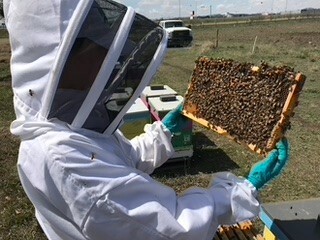World Honey Bee Day: A King's Student's Honey Bee Research

Oh honey, August 15 is World Honey Bee Day! There are many reasons why we should conserve honeybees and keep them buzzing through our ecosystem.
Students at King’s are able to pursue their passions and interests at the same time as helping the world become a better place. Rhonda Thygesen is a King’s student who used her time at King’s to really foster her interest in honeybees. She has been doing some sweet work with honeybees throughout her degree. Let’s see what the buzz is all about!
How many years have you been at King’s?
I recently graduated this year with a 4-Year Bachelor of Science Degree majoring in Biology and minoring in Chemistry.
Why did you choose King’s and the science program?
I transferred to King’s in September of 2018. The science faculty at King’s really engage with students one on one. They help develop personal strengths so that students are prepared for a future career that not only interests them but also aligns with their talents and abilities. It was this mentorship and also fostering of independence that attracted me to the science program and have stayed with me as a new grad.
What is your research about? Why honey bees?
My first research position was with the Alberta apiculture research program in the summer after my third year. I then continued to research honey bees with Dr. Heather Prior during my senior thesis project, "Bacteriophage therapy as a treatment for AFB in Alberta.” American Foulbrood (AFB) is a fatal bacterial disease of honey bee brood, and our research focused on phage therapy as an option for treatment rather than typical methods such as antibiotics. This project made heavy use of the microbiology portion of my degree. Dr. Darcy Visscher also mentored me in an independent research project titled "The spatial variation of, and soil variables influencing, honey production in central Alberta,” where we had the chance to work with Alida and Lorne Prins from the Gull Lake Honey Company. We used the data from the honey company’s 2019 season and Canada’s national soil database to determine if there were variables in Alberta's solonetzic soil that increased nectar production in canola crops and therefore honey yields in the hives for that year. The project relied on the skills I learnt in a previous course with Dr. Visscher, modelling in biology. Although the projects were very different and highlighted certain parts of my degree, they were integrated by an understanding of the bee world.
I chose to study honey bees because I was in search of more research experience, but I stayed because it interests me. When I think about honey bees I also think about agriculture, evolution, plant-insect interactions, food science, disease, and the list goes on. It’s these links between disciplines that attracts me. Not only do we get to be present outdoors as beekeepers, but we get to understand what their impact is on the environment and why this occurs from the results we see in the lab.
What are some ways we can conserve honey bees?
Helping the bees stay happy and healthy is a minimal effort thing to do. Probably the easiest form of aid is to support local beekeepers and organizations who work hard to nurture their bees. Alberta has a large local beekeeper community and many researchers working on projects. An easy way to show appreciation towards these initiatives is to buy locally-made honey and honey bee by-products. Giving your time, resources, and monetary donations will also allow these programs to grow. If you enjoy gardening and being outside then planting a bee garden is a good choice. Bees need a safe habitat to build homes and need to be near a variety of nutritious food sources. Bee gardens can either be small (ex. a few flower pots in your yard) or large (ex. a community garden). Planting a variety of flowers in a bee garden ensures blooms throughout changing seasons. This provides the bees and other pollinators with a constant source of food.
Within your garden you can also build a bee bath with clean water to quench their thirst. Arranging a bed of stones where the water sits just above will give the bees a place to land when they are thirsty. The most valuable method of all is to educate yourself and your family on honey bees. The options for learning are endless, from joining webinars and courses to creative projects at home. The bee community within Canada is extremely friendly and are always willing to share their knowledge.
It’s just un-bee-lievable what our King’s students do and how they do such things to give back to the world and our animals. A special thanks to Rhonda for giving us a look inside her world of honeybees and for giving us some ways to help along the way.
Happy Bee day!
Bianca